Complete Solutions to UNSOLVED NUMERICAL PROBLEMS of chapter CAPACITANCE of Class 12 book with complete answers and questions
| Class 12 | PHYSICS |
| Chapter | CAPACITANCE |
| PHYSICS GALAXY | UNSOLVED NUMERICAL PROBLEMS |
| Number Of Questions | 40 |
| Academic Year | 2023-24 |
Two square metal plates of side `1 m` are kept `0.01 m` apart like a parallel plate capacitor in air in such a way that one of their edges is perpendicualr to an oil surface in the a tank filled with an insulating oil. The plates are connected to a battery of emf `55 V`. The plates are then lowered vertically into the oil at a speed of `0.001 ms^(-1)`. Calculate the current drawn from the battery during the process.
(Dielectric constant of oil `=11, epsilon_(0) = 8.85 xx 10^(-12) N^(-1) m^(-2))`.
View SolutionThe capacitance of a parallel plate capacitor with plate area `A` and separation `d` is `C`. The space between the plates in filled with two wedges of dielectric constants `K_(1)` and `K_(2)` respectively. Find the capacitance of resulting capacitor.
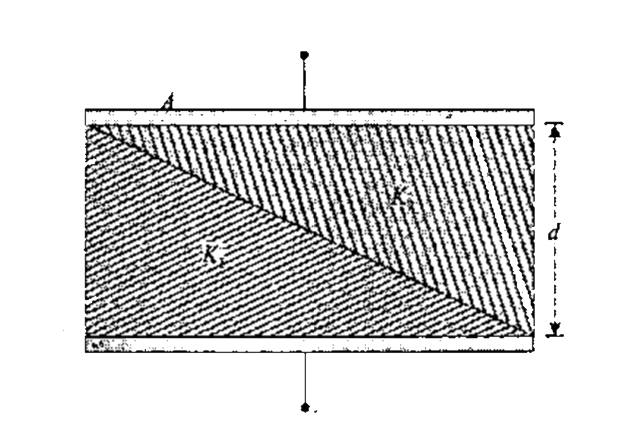
View SolutionTwo conducting objects one with charge of `+Q` and another with `-Q` are kept on `x`-axis at `x=-3` and `x=+4` respectively. The electric field on the `x`-axis is given by `3Q(x^(2)+4/3)`. What is the capacitance `C` of this configuration of objects?
View SolutionAn air cylindrical capacitor eith a `dc` voltage `V = 200 V` applied across it is being submerged vertivally into a vessel filled with water at a velocity `v = 5.0 mm//s`. The electrodes of the capacitors are separated by a distance `d = 2.0 mm`, the mean curvature radius of the electrodes is equal to `r = 50 mm`. Find the current flowing in this case along lead wires, if `d lt lt r`.
View SolutionBetween the plates of a parallel-plate capacitor there is a metallic plate whose thickness takes up `eta = 0.60` of the capacitor gap. When that plate is absent the capacitor has a capacity `C = 20 nF`. The capacitor is connected to a `dc` voltage source `V = 100 V`. The metallic plate is slowly extraced from the gap. Find :
(a) the energy increment of the capacitor,
(b) the mechanical work performed in the process of plate extraction.
View SolutionIn the circuit shown in figure, each capacitor has a capacitance `C` and cell voltage is `E`. If switch `S` is closed, then calculate the work done by battery after closing the switch.
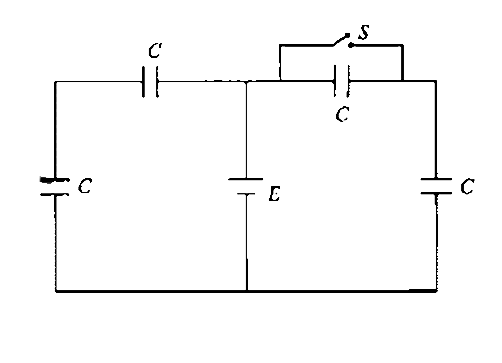
View SolutionFind the potential differnce `V_(A)-V_(B)` between points `A` and `B` of the circuit shown in.
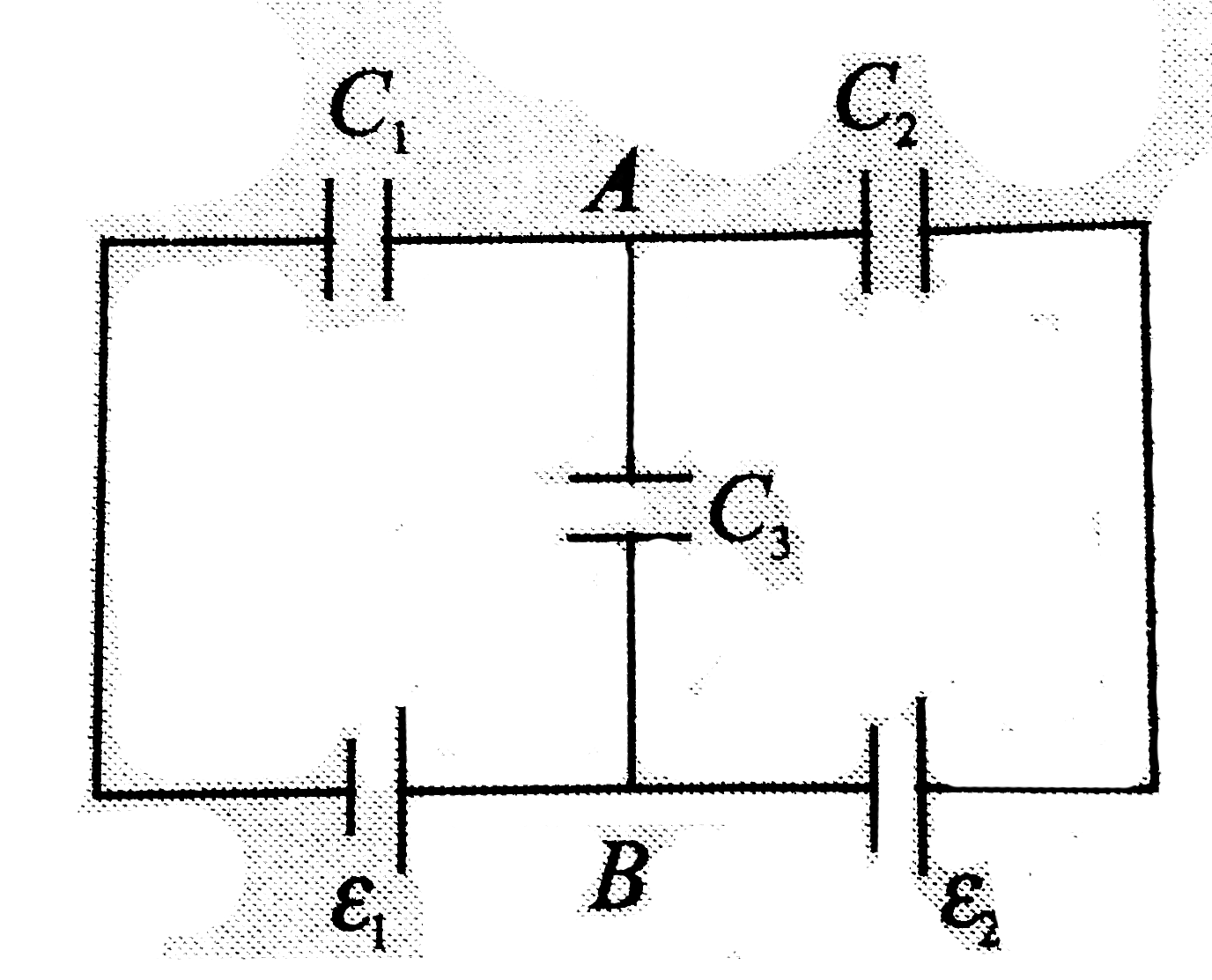 .
.
View Solution(a) Find the capacitance of spherical capacitor having concentric shells of radii a `a` and `b (bgta)`. The space between the shells is completely filled by a dielectric of constant `k`.
(b) Find the capacitance if dielectric is filled upto an intermediate radius `c(a lt c lt b)` between the shells.
View SolutionIf half the space between two concentric conducting spheres be filled with dielectric of dielectric constant `k` and the rest is filled with air. Show that the capacitance of the capacitor thus formed will be same as if the whole part is filled with the dielectric of dielectric constant `1/2(1+k)`:
View SolutionTwo, capacitors `A` and `B` are connected in series across a `100 V` supply and it is observed that the potential difference across them are `60 V` and `40 V`. A capacitor of `2 p.F` capacitance is now connected in parallel with `A` and the potential difference across B rises to `90 V`. Determine the capacitance of `A` and `B`
View SolutionThe voltage applied across a capacitor having a capacitance of `10muF` is varies as shown in figure:
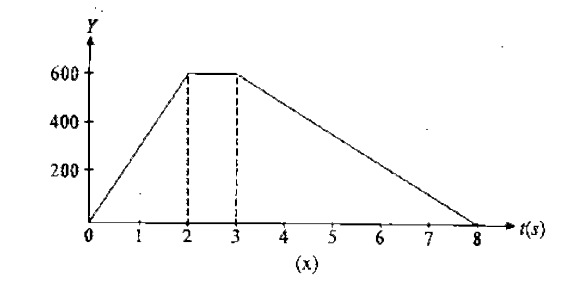
At the time instant when the terminal voltage across capacitor is 600V calculate
(a) The charge on capacitor ltBrgt (b) The energy stored in the capacitor
(c) Draw the curve of current in connecting wires as a function of time.
View SolutionA capacitor of capacitance C is charged by connecting it to a battery of emf epsilon. The capacitor is now disconnected and reconnected to the battery with the polarity reversed. Calculate the heat developed in the connecting wires.
View SolutionFind capacitance of the capacitor shown in figure: in which four same sized dielectric slabs are inserted with their
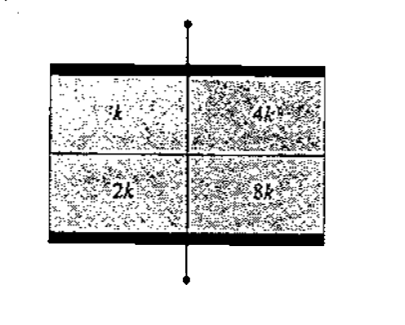
View SolutionWhat charges will flow after the shorting of the swich `Sw` in the circuit illustrated in Fig through sections 1 and 2 in the directions indicated by the arrown?

View SolutionA `1muF` capacitor and a `2µF` capacitor are connected in series across a `1200 V` supply line.
a. Find the charge on each capacitor and the voltage across them.
b. The charged capacitors are disconnected from the line and from each other and reconnected with terminals of like sign together. Find the final charge on each and the voltage across them.
View SolutionIf the total capacitance of the combination of identical capacitors shown in figure between `A` and `B` is given by `nC` then find `n`.
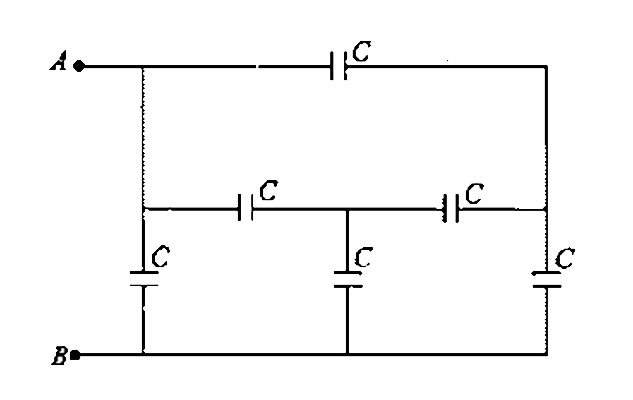
View SolutionA `100muF` capacitor is charged to `100 V`. After the charging, battery is disconnected. The capacitor is then connected in parallel to another capacitor. The final voltage is `20 V`. Calculate cap the capacity of second capacitor.
View SolutionThe dielectric to be used in a parallel-plate capacitor has a dielectric constant of 3.60 and a dielectric strength of `1.60 xx 10^7 V//m`. The capacitor is to have a capacitance of `1.25 xx10^-9F` and must be able to withstand a maximum potential difference of `5500 V`. What is the minimum area the plates of the capacitor may have?
View SolutionThe space between the plates of a parallel plate air capacitor is filled with an isotropic dielectric medium of which dielectric constant varies in the direction perpendicular to the plates according to the relation given as
`k=k_(1)[1+"sin"(pi)/dx]`
Where `d` is the separation, between the plates and `k_(1)` is a constant. The area of the plates is `A`. Determine the capacitance of the capacitor.
View SolutionTwo condensers `A` and `B` each having slabs of dielectric constant `K = 2` are connected in series. When they are connected across `230 V` supply, potential difference across `A` is `130 V` and that across B is `100 V`. If the dielectric in the condenser of smaller capacitance is replaced by one for which `K = 5`, what will be the values of potential difference across them?
View SolutionA parallel plate capacitor of capacitance `0.1muF` is shown in the figure. Its two plates are given charges `2muC` and `1muC`. Find the value of heat dissipated after switch is closed :
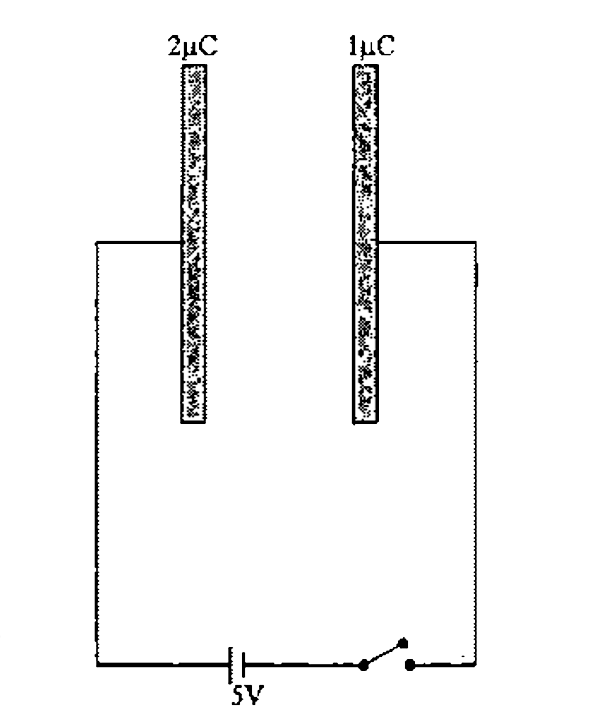
View SolutionTwo identical planar capacitor connected in parallel and charged to a voltage `U_(0)=12V`. When you disconnect them from the voltage source, the distance between the plates of one of the capacitors is reduced to one third of the original distance. What will be the new voltage on the capacitors ?
View SolutionA parallel - plate capacitor of plate area `A` and plate separation d is charged to a potential difference `V` and then the battery is disconnected . `A` slab of dielectric constant `K` is then inserted between the plate of the capacitor so as to fill the space between the plate .Find the work done on the system in the process of inserting the slab.
View SolutionA parallel plate vacuum capacitor with plate area A and separation x has charges `+Q` and `-Q` on its plates. The capacitor is disconnected from the source of charge, so the charge on each plate remains fixed.
(a) What is the total energy stored in the capacitor?
(b) The plates are pulled apart an additional distance dx. What is the change in the stored energy?
(c) If `F` is the force with which the plates attract each other, then the change in the stored energy must equal the work `dW = Fdx` done in pulling the plates apart. Find an expression for `F`.
(d) Explain why `F` is not equal to `QE`, where `E` is the electric field between the plates.
View SolutionFind the equivalent capacitance across terminals `A` and `B` in the circuit shown in figure.
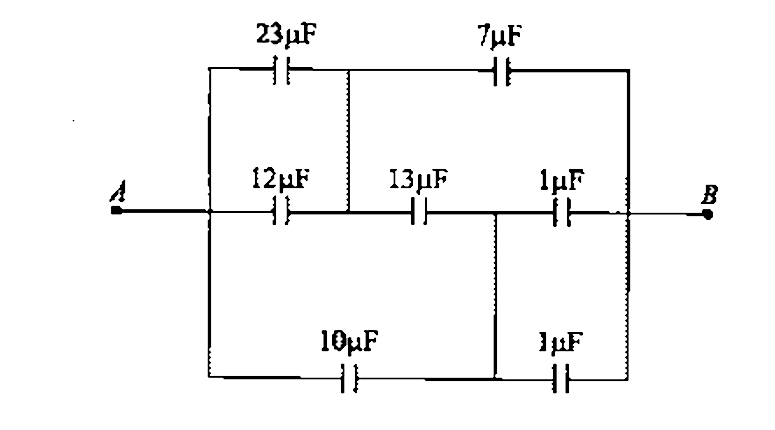
View SolutionIn the circuit shown in figure, capacitor `A` has capacitance `C_(1)=2muF` when filled with a di-electric slab of dielectric constant `k=2`. Capacitors `B` and `C` are air capacitors and have capacitances `C_(2)=3muF` and `C_(3)=6muF`, respectively. A is charged by closing switch `S_(1)` alone
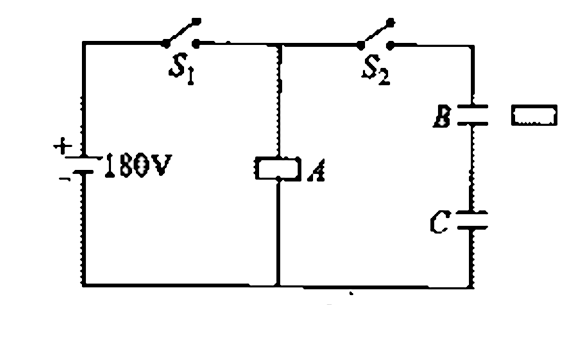
(a) Calculate energy supplied by battery during process of charging. Switch `S_(1)` is now opened and `S_(2)` is closed.
(b) Calculate charge on `B` and energy stored in the system when electrical equilibrium is attained. Now switch `S_(2)` is also opened, slab of `A` is removed. Another di-electric slab of `K=2`, which can just fill the space in `B`, is inserted into it and then switch `S_(2)` alone is closed.
(c) Calculate by how many times electric field in `B` is increased. Calculate also, loss. of energy during redistribution of charge.
View SolutionIn the circuit shown in figure `C_(1)=5muF, C_(2)=29muC, C_(3)=6muF, C_(4)=3muF` and `C_(4)=7muF`. If in steady state potential difference between points `A` and `B` is 11 volt, calculate potential difference across `C_(3)`.
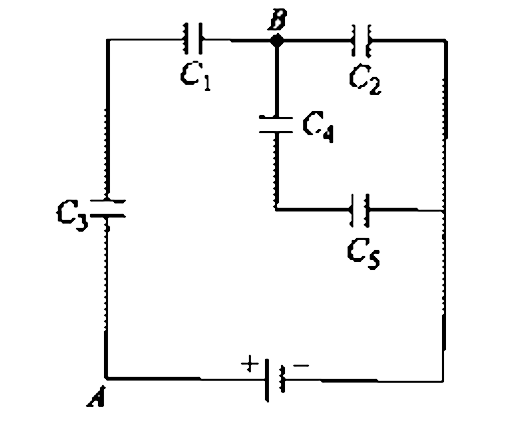
View SolutionFind the equivalent capacitance between terminals `A` & `C`, if each capacitor is of capacitance `4muF`
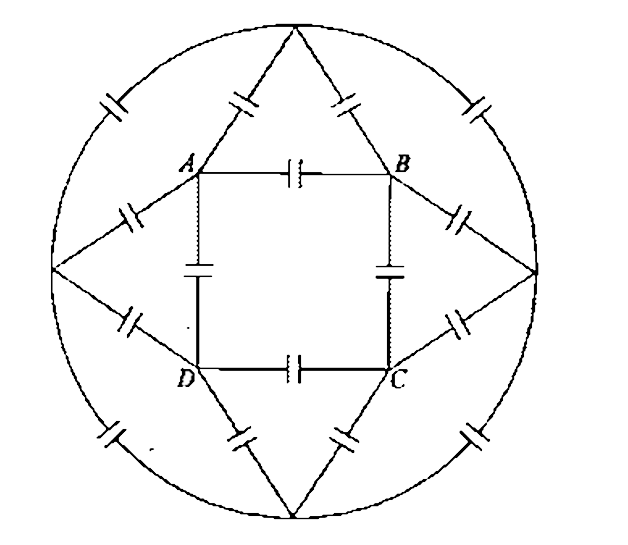
View SolutionIn the given network if potential difference between `p` and `q` is `2V` and `C_(2)=3C_(1)`, find the potential difference between `a` & `b`.
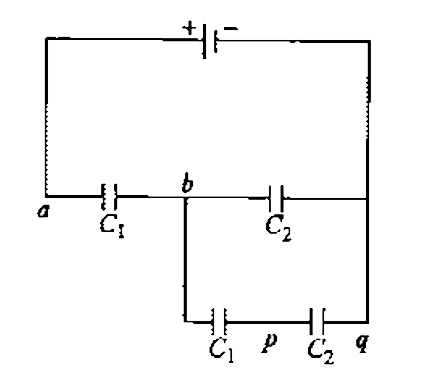
View SolutionThe plates of a parallel plate capacitor are separated by a distance `d = 1 cm`. Two parallel sided dielectric slabs of thickness `0. 7cm` and `0.3cm` fill the space between the plates. If the dielectric constants of the two slabs are 3 and 5 respectively and a potential difference of `440V` is applied across the plates. Find (a) The electric field intensities in each of the slabs. (b) The ratio of electric energies stored in the first to that in the second dielectric slab.
View SolutionTwo parallel plate capacitors of capacitance `C` and `2C` are connected in parallel then following steps are performed.
(i) A battery of voltage `V` is connected across the capacitors.
(ii) A dielectric slab ofrelative permittivity `k` is slowly inserted in capacitor `C`.
(iii) Battery is disconnected.
(iv) Dielectric slab is slowly removed from capacitor.
Find the heat produced in (i) and work done by external aent in step (ii) & (iv).
View SolutionA charge `200mC` is imparted to .each of the two identical parallel plate capacitors connected in parallel. At `t = 0`, the plates ofboth the capacitors are `0.1 m` apart. The plates of first capacitor move towards each other with velocity `0.001 m` is and plates of second capacitor move apart with the same velocity. Find the current in the circuit.
View SolutionA circuit is shown in figure. Find the charge on the condenser having a capacity of `5muF` in steady state.
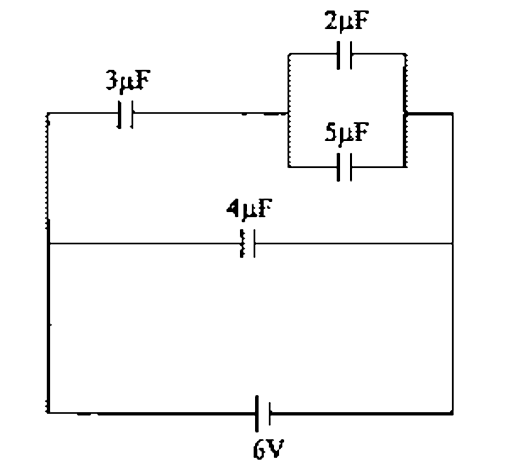
View SolutionA solid conducting sphere of radius `10 cm` is enclosed by a thin metallic shell of radius `20 cm`. A charge `q = 20 mu C` is given to the inner sphere is connected to the shell by a conducting wire.
View SolutionThree capacitors each having capacitance `C=2 muF` are connected with a battery of emf`30 V` as shown in. when the switch S is closed, find
a. the amount of charge flowing through the battery ,
b. the heat generated in the circuit,
c. the energy supplied by the battery,
d. the amount of charge flowing through the switch S.
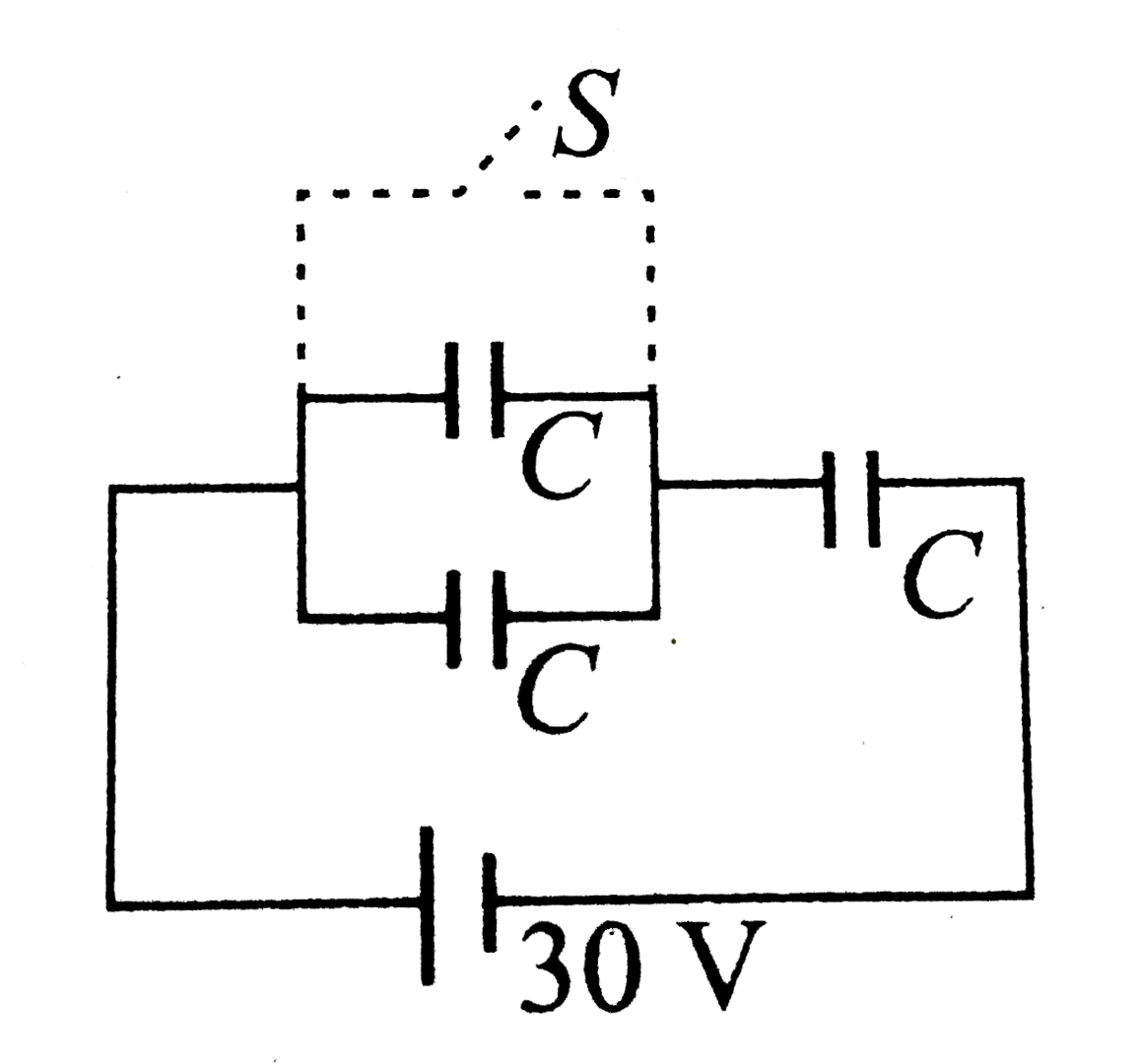 .
.
View SolutionConsider the situation shown in figure. The plates of the capacitor have plate area `1A = lb1` and are clamped in the laboratory. The dielectric slab is released from rest with length a inside the capacitor. Neglecting any effect of friction or gravity, show that the slab will execute periodic motion and find its time period.
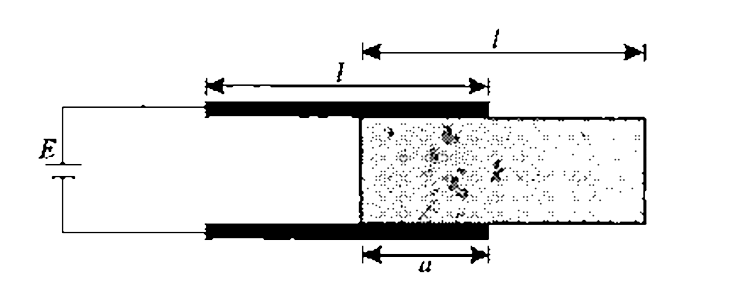
View SolutionIn the circuit shown in figure find the equivalent capacitance between terminals `A` and `B`.
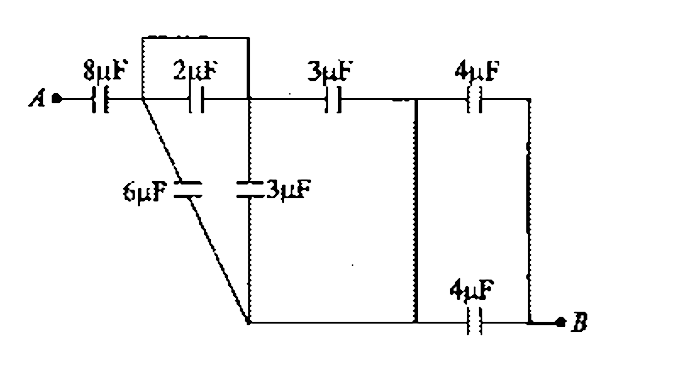
View SolutionA capacitor is made of a flat plate of area `A` and another plate is bent at four points and placed above the flat plate as shown in figure. Dimension of both the plates are shown in figure. Find the capacitance of this structure between the two plates.
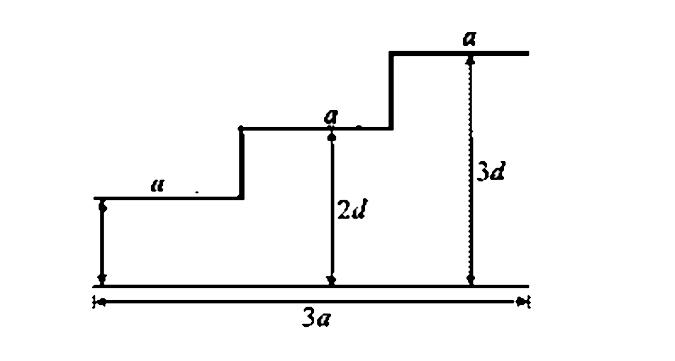
View SolutionA parallel -plate capacitor with the plate area `100cm^2` and the separation between the plate `1.0cm` is connected across a battery of emf 24 volts .Find the force of attraction between the plates.
View SolutionFigure shows a capacitor having three layers of equal thickness and same area as that of its plates. Layer-I is free space, Layer-II is a conductor and Layer-Ill is a dielectric of dielectric constant `k`. Calculate the ratio of energy stored in region III to total energy stored in capacitor when a potential difference is applied across the plates of capacitor.
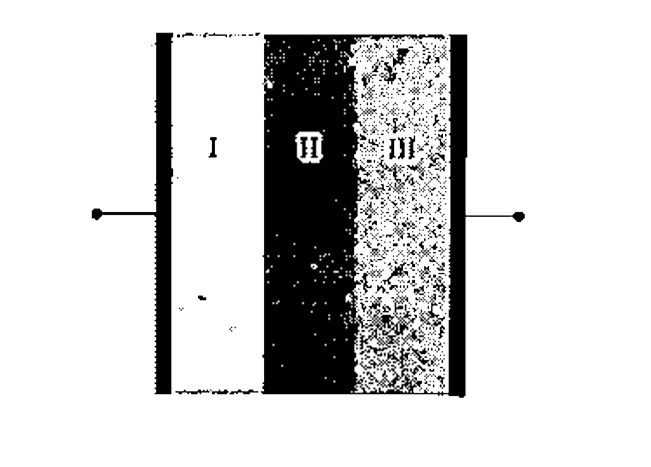
View Solution
UNSOLVED NUMERICAL PROBLEMS questions and complete solutions for chapter CAPACITANCE of GK PUBLICATIONS PHYSICS (HINGLISH) of Class 12